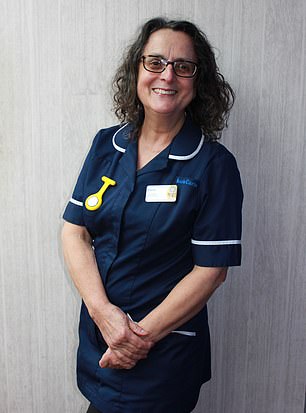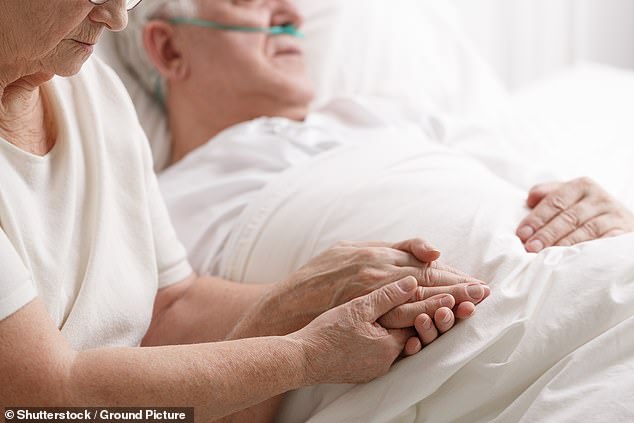
Maria Sinfield, an end of life nurse from Lancashire (pictured) has worked for end of life charity Marie Curie for a decade
Death is the inevitable consequence of life that we will all face one day.
But what is it like to die? And what do they say or do on the brink in their last moments?
Here, hospice nurse Maria Sinfield shares with MailOnline what happens to your body as death approaches, as well as the most common things people say and do towards the end.
The Lancashire nurse has worked for the Marie Curie charity for a decade and has seen first-hand what patients experience in their final days.
She says patients can become confused, hallucinate and even yell at loved ones who have already passed as they die.
Ms Sinfield, 64, also said families can find the last days of their loved ones’ lives “terrifying” as they witness their bodies slow down and eat less.
She says it’s crucial to remember that everyone’s end-of-life experiences can be different.
However, Sinfield added that while thinking about death can be difficult, it can make it easier for the family to understand what to expect.


Graduate nurse explains that patients can become confused, hallucinate and yell at loved ones who have already passed
At death, your vital organs stop working, your brain and heart stop, and you stop breathing.
But in many cases this is not sudden and during the dying process the body begins to slow down as vital systems begin to weaken.
This can lead to a person losing consciousness and experiencing changes in their behavior that can bother loved ones, Ms Sinfield explains.
‘You see gradually over the last weeks and days that someone really slows down and gets very tired easily. Families may notice that the person is sleeping more,’ she says.
She explains that many people at the end of their lives need to build up their energy to carry out even basic tasks, like having a conversation or eating a meal.
Ms Sinfield says the latter is often a major ‘concern’ for families, but explains that this is normal.
“Often the person doesn’t use as much energy, they’re not as active, so they need less food and drink,” she says.
She adds that as a person’s body begins to slow down, they may also struggle to regulate their temperature and feel unusually hot and cold as their blood circulation begins to slow.
“It’s important to just go with the individual and how they feel at the time,” Ms Sinfield says.
As a patient reaches their last few hours of life, Ms. Sinfield explains, their breathing pattern changes subtly, becoming slower and shallower.
The breathing changes can be so small and gentle that the family may not notice that the patient has stopped breathing for long periods of time, she says.
“Sometimes when that breathing changes and the person has lost consciousness and they’re not able to talk to the family anymore, they’re not able to clear the secretions in the mouth or in the throat,” she says.
This can cause a ‘rattling noise’ or a ‘secretion noise’ which can be ‘very disturbing’ to hear.
‘It doesn’t cause the person dying any distress or pain,’ says Ms Sinfield, adding that changing the person’s position can help.
Although death is natural, Ms Sinfield says she thinks many people find the concept and process terrifying.
However, she does not shy away from talking openly about it and avoids using euphemisms such as ‘fading away’.
Instead, she believes that as a nurse she has a responsibility to be ‘honest’.
‘I talk very openly with families about what to expect when their loved one dies. I also use that language,’ she says.
‘Family often want to protect their loved ones from death because they are afraid.’
But it is not just the families who have to come to terms with death.
Many people feel at the end of their lives that they have to see people or make amends, says Ms Sinfield.
“Some people accept that they are dying, but you may find that others may not,” she says.
‘Some people have things they want to do or say they haven’t done.
‘I remember one particular patient who was upset because they needed to speak to a family member they hadn’t spoken to in a while, but we were able to get that family member to them.
‘They were really grieving before that and seeing the family member really made a difference, just to know the person was there.’
She has also witnessed cases, even in her own family, where people have called out to deceased loved ones as if they were in the room with them.
“From a very personal point of view, I was with my father when he died and he was calling out for his mother and father as if they were there,” she says.
‘He hadn’t been confused or anything, he was in the last hours of life and was passing in and out of consciousness.
‘Having a relative sit with him was nice, I felt he would be safe and secure.’
In some cases, patients may feel “restless” and confused, but it can help to make that person comfortable and provide support, Ms Sinfield explains.
“Symptom management is key to end-of-life care to ensure the person is at their best without being oversedated,” she says.
“There’s a real balance between making sure we’re giving that person the best quality of life they can possibly have.”
In addition to medication, this care also often includes emotional support.
Ms Sinfield says some people can naturally feel “worried” when death approaches.
But she notes that in many cases the patient just needs someone to talk to.
Mrs. Sinfield remembers a case where a dying man was worried about his wife, and all he needed was someone to listen and just talk to him, and not be afraid to do it.
She adds that some people struggle with confusion at the end of their lives, and it can be in the form of hallucinations that come on suddenly.
“Sometimes confusion can set in when someone has had a deep sleep,” she says.
‘In the last few hours, that person could have lost consciousness and then woke up from that, because that’s what naturally happens, and then woke up in what seems like a strange environment.’
Marie Curie is free support line is available to anyone with a disease they are likely to die from and those close to them.
It offers practical and emotional support for everything from symptom management and daily care to financial information and bereavement support.
